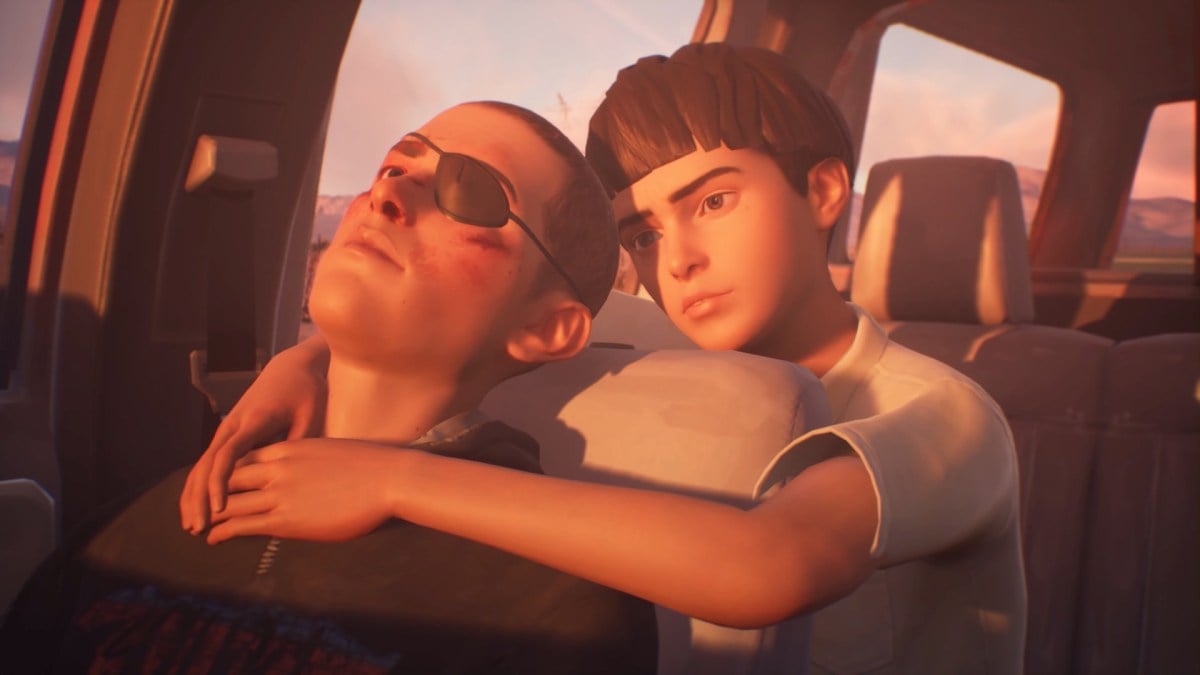Life is Strange 2 has been quite a wild ride so far. The season had its ups and downs, which had me wondering about the newest episode’s quality before its release. Fortunately, it turns out that “Faith” is one of the high points for the season, thus far.
As is the case with narrative adventure games, the main draw of Life is Strange 2 is its story. This episode certainly delivers on that front. If you’re invested enough in Sean and Daniel’s story to make it this far in, then you won’t be disappointed. “Faith” sees some of the game’s most intense and anxiety-inducing moments to date while keeping the emotional stakes high and the narrative and character developments interesting.
In particular, this fourth episode takes on many social issues prevalent in American society, from white nationalism to religious hypocrisy and cultism to gay conversion therapy. The episode effectively deals with these issues in a personal way that has the potential to impact the player in ways they may not otherwise be able to experience.
For example, there was a particular situation during the episode that, as a white person in real life, I usually would not have had to think much about. However, encountering it from Sean’s perspective, a Mexican boy in the United States during 2017, had me thinking about several repercussions I usually don’t consider.
The game puts players into the shoes of someone else to experience what life might be like for other people. It encourages players to empathize with the experiences of those different from them in ways that may not have occurred to them otherwise. This unique perspective, I feel, is the greatest strength of Life is Strange 2.
Aside from the social commentary, the episode keeps the player invested with its emotional storytelling, high-stakes drama, likable characters, and sense of uncertainty. There’s no clear way of how exactly these brothers’ story will play out and end—in many stories, a relatively happy ending gets taken for granted. But not here, which can keep players even more invested, unable to predict a cliché ending.

The low points of the episode are ones that have been prevalent throughout the season. Sometimes the animations are a bit weird where the lip-syncing and voice acting don’t play with each other appropriately. Not to mention some character motivations or actions (or inactions) are a bit questionable. However, these issues happen in small chunks and are dismissive. The majority of the episode features much higher highs than the lows.
A continuous gripe players may have throughout the season is that, for a narrative adventure game, Life is Strange 2 doesn’t contain a whole lot of player involvement. This trend remains true for “Faith,” as well. You can go for stretches of up to fifteen minutes without inputting a single button command. Dialogue choices a pretty rare, especially for a genre that tends to have several per conversation. Many of the dialogue choices that do show up are often choices between saying the same thing in two or three different ways.
In this sense, Life is Strange 2 plays out more like an interactive movie. Things like the character’s personality, relationships between characters, and general plot points stay the same. The player has control of relatively minor choices here or there that don’t impact almost anything. Not every narrative adventure game can be as branching as Detroit: Become Human. However, something like Telltale’s The Walking Dead gave players more control over the character’s personality and relationships with others.
In terms of how much agency the player directly has over these types of factors, Life is Strange 2 is somewhere in the middle of typical narrative adventure game and an interactive movie. There’s more interactivity and agency than the latter, while not entirely living up to the former.
However, if you’ve made it this far into Life is Strange 2, then you’re probably used to and are more or less okay with the fact. You’ll likely be okay with more or less being along for the ride of Sean and Daniel’s story. And, despite the general lack of much player agency, an aspect of the game that continues to be extremely interesting is how Daniel’s character develops and what choices he makes. These are dependent on the actions that the player has Sean make throughout the game, even the minor ones. Looking over the choice stats of this latest episode, you’ll see that the episode can end in some pretty different ways depending on what the player decides to do. Additionally, these decisions bleed on to Daniel and how he gets raised and grows over the episode. This prospect of shaping Daniel’s character remains intriguing, and it will be interesting to see how it culminates in the upcoming final episode.
The fourth episode of Life is Strange 2 doesn’t necessarily fix the few problems the season has had so far. Whatever small issues it may have are substantially outweighed by the positive aspects of the game, with this episode in-particular being one of the best in the season yet. The last episode of the season is coming up in a few months. If you are someone who loved the first Life is Strange or who is a fan of story-driven games in general, you should check out Life is Strange 2. Now is an excellent time to jump on board.
Gamepur team received a PC code for the purpose of this review.



Published: Aug 26, 2019 06:04 pm